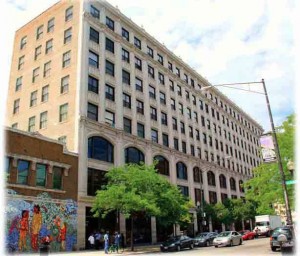 It is hard to imagine in today’s world, which is fascinated by and consumed with a desire for ever more “modern” things, that a 1920’s 8-story office building in Chicago referred to for decades as “The Kemper Building”, could still be standing. It is even more unimaginable that it could still be supporting and being an integral part of the thriving mission of the Institute of Cultural Affairs in a beautiful and sustainable manner.
It is hard to imagine in today’s world, which is fascinated by and consumed with a desire for ever more “modern” things, that a 1920’s 8-story office building in Chicago referred to for decades as “The Kemper Building”, could still be standing. It is even more unimaginable that it could still be supporting and being an integral part of the thriving mission of the Institute of Cultural Affairs in a beautiful and sustainable manner.
We know today that buildings are a major source of greenhouse gas emissions, whose impact we observe daily in the extreme weather events around the world. It is estimated that up to 70% of Chicago’s greenhouse gas emissions come from buildings. Tearing down and rebuilding is not a possibility. The “throw-away” economy is not only unsustainable, but downright destructive. Everyone will need to learn not only how to “make do with what you have”, but actually THRIVE on a new type of economy and relationship to our assets. Instead of looking at our buildings as “problems”, we can begin to look at them as “goldmines of energy-saving opportunities” and a reflection of how we relate to the rest of the world around us.
This archival collection (The ICA GreenRise Collection) chronicles the history of this vintage 8-story office building as it adapted and evolved over the decades to meet the needs of the ICA and its shifting mission since 1972. It includes insights on how to systematically retrofit a building with the resources you have.
It went from ICA’s International staff residences and Research & Training Center, to a mixed-use Uptown Community Resource Center and now to a Historical Landmark building demonstration which experiments with all things sustainable, including repurposing assets and creating resilient community life. This building could well have been sold or demolished along the way to make way for new condominiums or a parking garage, but instead, it stands as an example of how revitalization of buildings and neighborhoods can happen without displacing people or reducing services